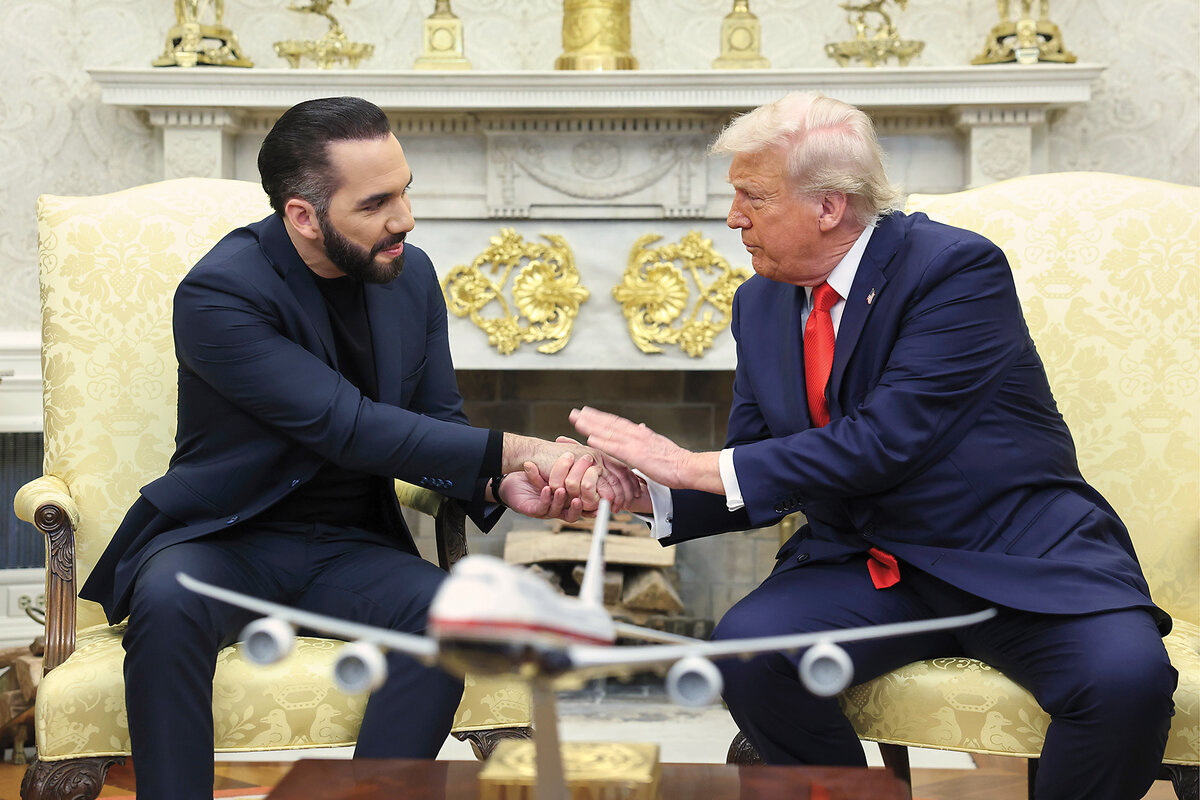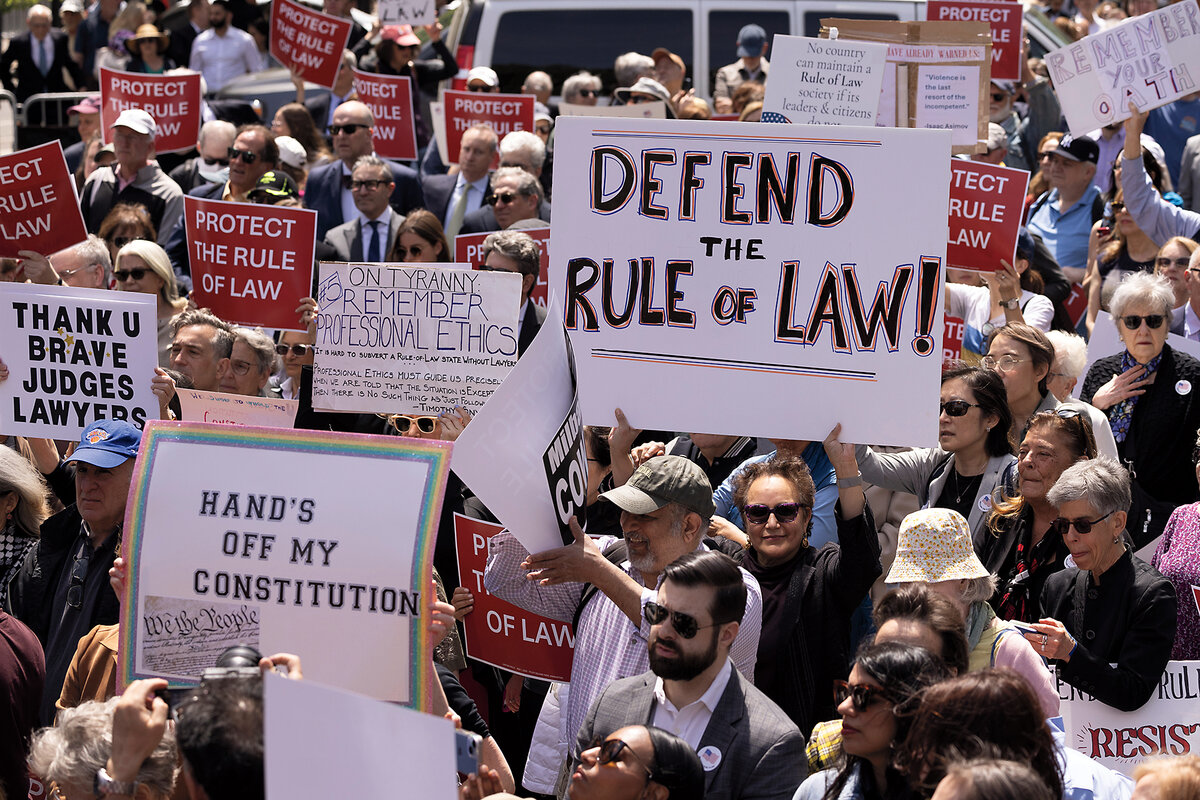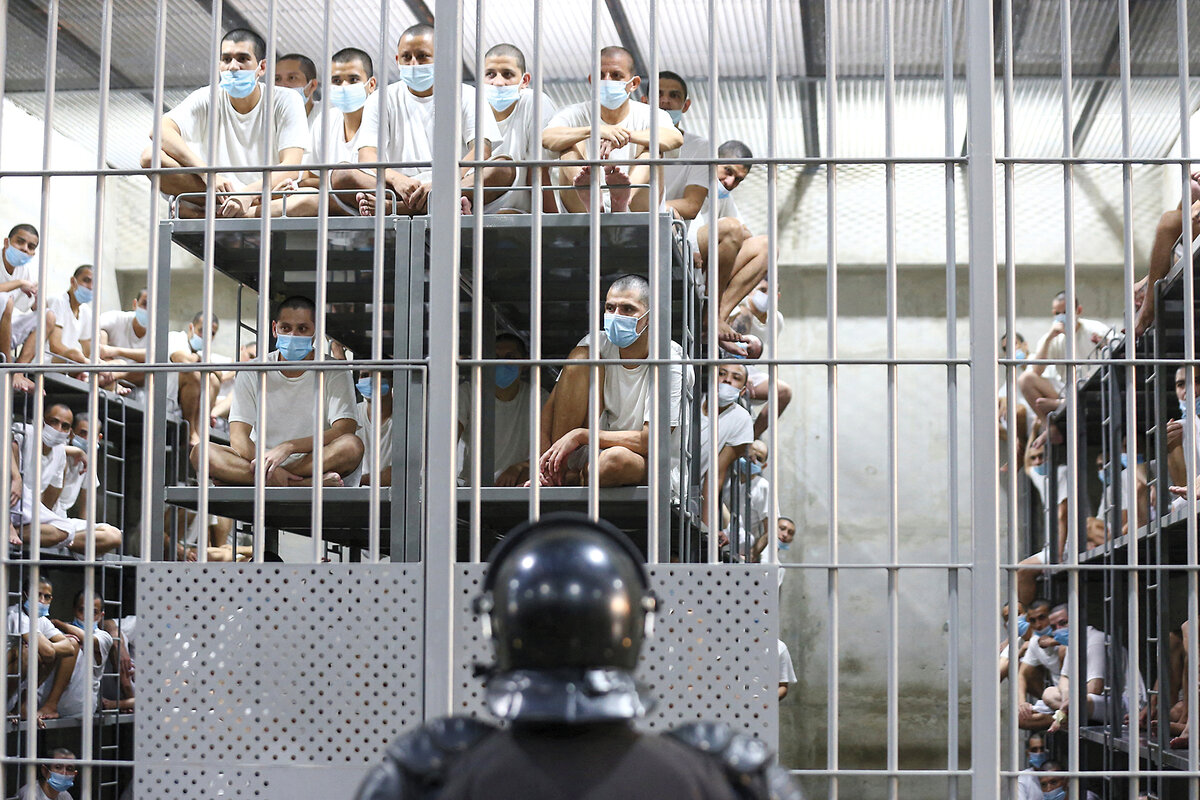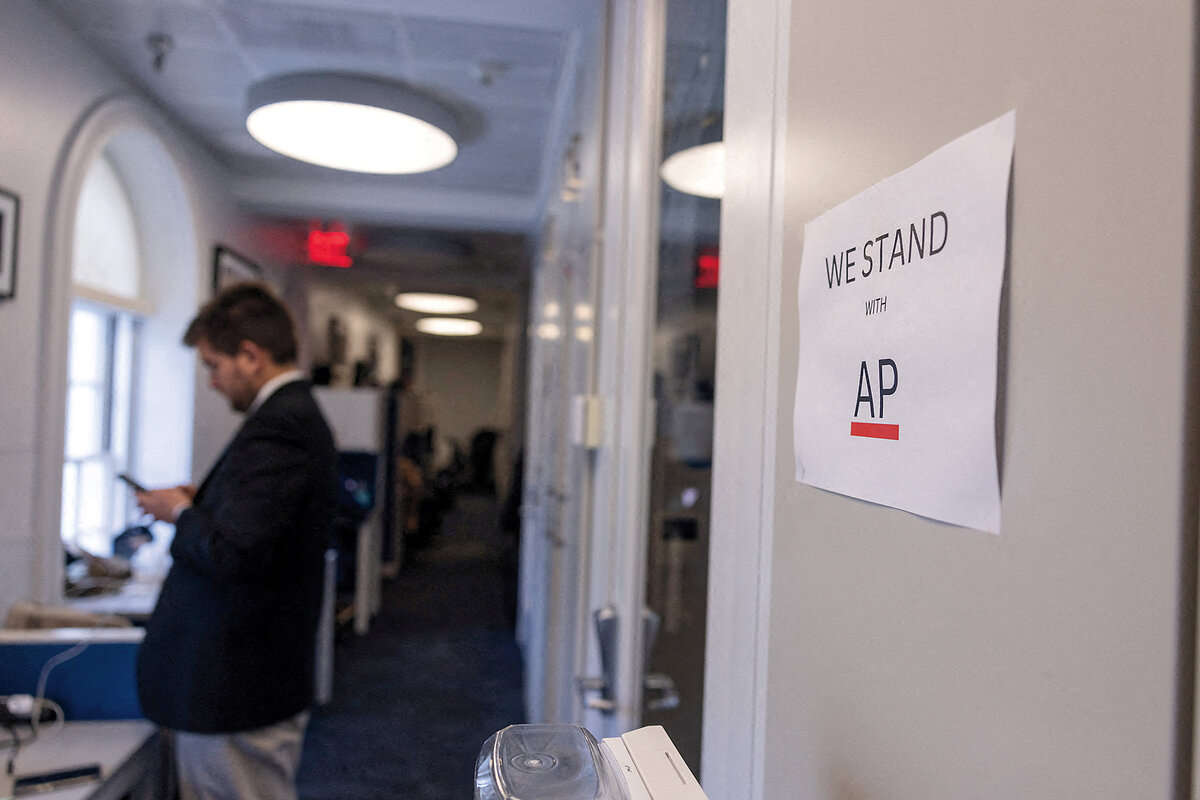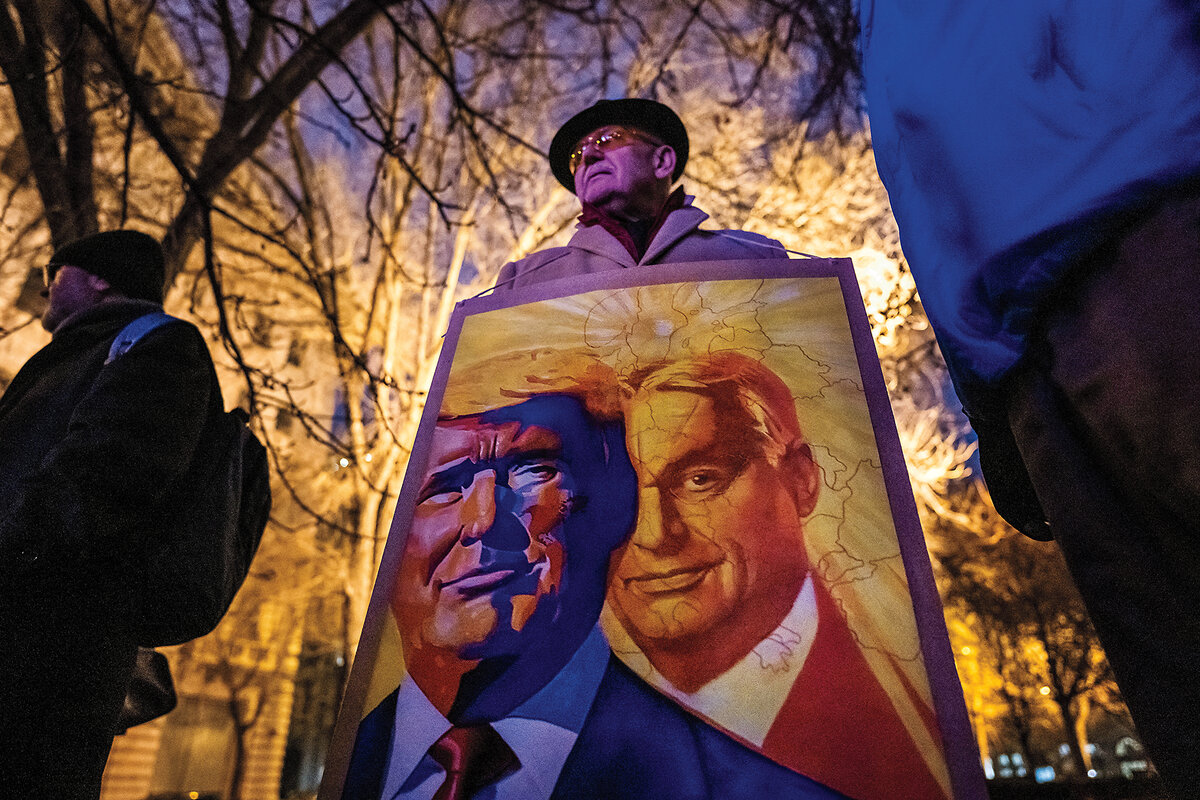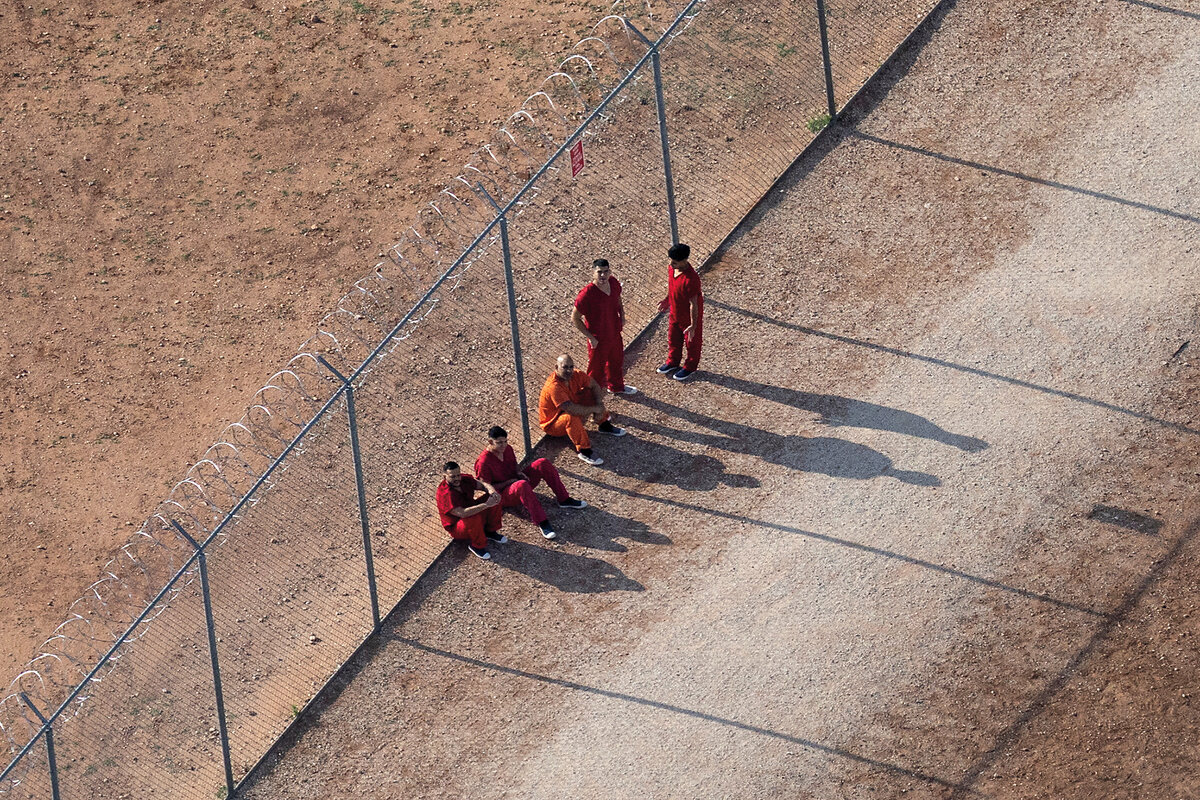They’ve watched democracies fail. They see it happening under Trump.
Loading...
| Washington
President Donald Trump and Salvadoran President Nayib Bukele were all smiles.
The leader of the free world and the Central American leader who has described himself as the “world’s coolest dictator” sat in the Oval Office in mid-April, discussing their agreement to send hundreds of deported migrants to El Salvador’s notorious prison system. The Trump administration claimed they had ties to gangs it had recently designated as foreign terrorist organizations and denied them due process – a chance for them to challenge those claims before they were shipped abroad.
Mr. Trump has faced multiple court challenges to these deportations. One of the prisoners has become a focal point: Kilmar Abrego Garcia, a Salvadoran national who resided in Maryland and is married to a U.S. citizen. A Justice Department attorney admitted in court that Mr. Abrego Garcia had been sent back to his native country because of an “administrative error.”
Why We Wrote This
Experts say the American president is borrowing a playbook from other elected leaders who have used the tools of democracy to undo it.
In early April, a federal court judge in Maryland ordered that he be brought back to the United States. The Justice Department sought to overturn that ruling. Then, just days before Mr. Bukele’s visit to the White House, the U.S. Supreme Court ruled unanimously that the Trump administration needed to “facilitate” Mr. Abrego Garcia’s return.
Now, in front of a scrum of White House reporters, the two leaders made it clear they would not do so. “The question is preposterous,” Mr. Bukele said. “How can I smuggle a terrorist to the United States?”
Over the previous six years, Mr. Bukele has dramatically reduced one of the highest homicide rates in the world by declaring a state of emergency, ousting unfriendly judges and prosecutors and racking up the highest incarceration rate in the world. Roughly 1.7% of El Salvador’s population is now behind bars, according to Human Rights Watch – most without ever getting a trial or having access to lawyers or their families.
“They say that we imprisoned thousands,” Mr. Bukele said. “I like to say that we actually liberated millions.”
“That’s very good,” Mr. Trump replied with a grin. “Who gave you that line? Do you think I could use that?”
The event marked an escalating confrontation that the Trump administration has triggered with the cornerstones of American democracy and rule of law: individual judges and lawyers, career government employees, universities, the press, and the courts.
Mr. Trump, his political allies, and his core supporters say he is reasserting the rightful power of the president and bringing an overdue reckoning for an administrative state of unelected bureaucrats who wield undemocratic authority over the lives of Americans.
Among those who study authoritarian regimes, a consensus has emerged that his early moves display common characteristics of burgeoning autocracies.
The Monitor talked to a dozen experts who have spent their careers studying, and working to defend, democratic institutions from Hungary to Colombia to El Salvador. They were nearly unanimous in their assessment that President Trump is following a familiar pattern.
Would-be autocrats often move to eliminate structural checks on their power. They intimidate opposition parties, threaten potential dissenters within their own ranks, and defy the courts. Autocrats punish and bully the news media, protect allies from legal prosecution while targeting political opponents, and purge senior military and government ranks of career staff in favor of loyalists.
President Trump has checked all of those boxes, says Larry Diamond, a senior fellow at the Hoover Institution who has spent four decades studying how and why democracies fail.
“If we were slipping into an authoritarian situation, step by step, it would pretty much look like what’s happening right now,” he says.
An emerging consensus among observers
For years, Bright Line Watch, a survey of American political scientists, had steadily delivered fairly positive ratings of U.S. governance – including during most of Mr. Trump’s first term.
But its two surveys since Mr. Trump’s return to office showed a plunge in their confidence in the strength of American democracy. The 760 political scientists surveyed in the latest round, released in early May, now rank the U.S. below Poland and Mexico for its democratic performance. Their evaluations of U.S. democracy dropped most sharply on questions of free speech protections, whether government agencies are used to punish political opponents, freedom of the press, the impartiality of criminal investigations, and judicial independence.
“Political scientists are in a state of alarm I’ve never seen before,” says Brendan Nyhan, Bright Line Watch co-director and Dartmouth professor of presidential studies. “We know what this looks like, and what we’re seeing is right out of the authoritarian playbook.”
Other surveys reflect this view. In its 2025 annual report released in February, Freedom House no longer listed the U.S. among the world’s most stable democracies. Similarly, the academic Germany-based Democracy Matrix recently classified the U.S. as a “deficient democracy,” ranking behind Chile and Latvia.
The U.S. is currently moving faster toward autocracy than any other fully democratic government that has backslid in the 21st century besides El Salvador – faster even than Hungary, Poland, or Venezuela, says Steven Levitsky, senior democracy fellow at the Council on Foreign Relations, Harvard professor, and co-author of the book “How Democracies Die.”
“If you compare [Mr. Trump to] the behavior of those governments in their first months – all of them, all of them – this is much worse,” he says.
When the Monitor first talked to Dr. Levitsky, in late February, he expressed deep concern about where Mr. Trump’s early actions were leading. Just a few weeks later, in a follow-up conversation, he said he’d underestimated how bad things would get – and how fast. “The pace and actions are almost unprecedented among electoral autocracies in the 21st century,” he says.
It isn’t just academics who are concerned. “We are all afraid,” Lisa Murkowski, a Republican senator from Alaska and one of the few in her party who has been willing to criticize President Trump, said recently. “I’m oftentimes very anxious myself about using my voice because retaliation is real.”
Kentucky Republican Sen. Rand Paul said on the Senate floor in late April that he didn’t want to live under the “emergency rule” that the president had invoked to impose tariffs. “I would want to live under a constitutional republic where there are checks and balances,” he said. His push to rein in President Trump’s tariffs failed on a Senate vote.
Recent polls have shown growing concern among Americans. A Washington Post-ABC News-Ipsos poll found that 64% of respondents thought President Trump is “going too far” in “trying to expand the power of the presidency.”
The democracy experts interviewed for this story expressed varying levels of confidence in the ability of the American constitutional system and civil society to withstand the pressures they see being exerted on them by the administration.
All said, however, that if President Trump no longer has to answer to the courts in a meaningful way, the U.S. will cease to be a liberal democracy.
“It’s very important to keep an intense focus on the rule of law,” says Dr. Diamond of the Hoover Institution. “The more that [Mr. Trump] defies and disrespects the federal courts along the way, the more we have indicators of a gathering constitutional crisis. And the more that he seeks to abuse his authority by trying to weaponize the power of the federal government against his enemies, the more people should be concerned about the future of our democracy.”
Judicial independence and the balance of power
Whether a country is a liberal democracy isn’t a simple yes-or-no question.
“People tend to think of these things in terms of binary outcomes, and it’s really important to remember that they tend to vary on a continuum, and the extent of the [democratic] erosion varies by domain,” says Professor Nyhan at Bright Line Watch.
One common and consequential sign of fledgling autocracies is the erosion of judicial independence. Courts themselves are an imperfect check on executive power. They’re reactive, slow, and limited. But few disagree that if the president disobeys the courts, especially the Supreme Court, the U.S. is no longer functioning as a liberal democracy.
“I believe that the creation of an independent constitutional court ... is probably the most significant single contribution the United States has made to the art of government,” the late Chief Justice William Rehnquist observed.
Experts worry that that independence is in jeopardy.
“We are seeing a push across the board to weaken legal limits on executive power and to weaken the ability of the judiciary to check executive power. Those are very worrying developments,” Professor Nyhan says. “Given how passive and meek Congress has been at defending its prerogatives ... we have to depend more on the law and the judiciary to hold the line, and they’re under a tremendous amount of pressure right now.”
Presidents have periodically tested the courts’ power, but few have openly defied court rulings. Abraham Lincoln suspended the writ of habeas corpus early in the Civil War even though the Supreme Court ruled he lacked the authority to do so. (He eventually got congressional approval.) Franklin D. Roosevelt had a speech prepared to say he would defy a Supreme Court ruling in a 1935 case regarding his adjustment of the gold standard during the Great Depression. But the court ruled in his favor, and he never delivered it.
Gerard Magliocca, a Supreme Court historian and constitutional scholar at Indiana University, says that there was “no precedent for outright presidential defiance of a Supreme Court order” – and that he did not believe the Trump administration had reached that point yet.
“I’m not defying the Supreme Court,” the president told Time magazine in late April. “I wouldn’t do that. I’m a big believer in the Supreme Court.”
But in an interview ABC News aired the same week, Mr. Trump openly said that he “could” bring back Mr. Abrego Garcia simply by calling Mr. Bukele, but that he chose not to.
In early May, Mr. Trump said, “I don’t know” when asked by NBC News if he had to uphold the Constitution.
The president is also seeking to constrain lower court power. His administration has asked the Supreme Court to strip lower court judges of their ability to issue nationwide “universal” injunctions that put administration policies on hold until the courts can rule. That would mark a dramatic shift in the power of the courts to check the executive branch. The Supreme Court is scheduled to hear oral arguments on the case May 15.
“We cannot allow a handful of communist, radical-left judges to obstruct the enforcement of our laws and assume the duties that belong solely to the president of the United States,” Mr. Trump said during a speech in Warren, Michigan, marking his first 100 days in office April 29.
In March, Mr. Trump invoked the 1798 Alien Enemies Act to remove close to 250 people the administration claimed had affiliations with Venezuelan and Salvadoran gangs. Lawyers for a number of those sent to El Salvador say they had no gang ties at all, and in a number of cases there has been no evidence produced of such ties. Chief Judge James Boasberg ordered the administration to pause any removals under the statute and turn the planes around. The Trump administration refused, claiming the planes had reached international waters, which meant Judge Boasberg had no jurisdiction.
“Oopsie ... Too late,” Mr. Bukele posted on the social platform X in response, with a laugh-crying emoji. White House communications director Steven Cheung promptly reshared his post.
One Trump appointee ruled in early May that the president’s invocation of the Alien Enemies Act was not legal. A second Trump-appointed judge reaffirmed a ruling a few days later that the Trump administration must “facilitate” the return of a second man sent to El Salvador’s prison system who didn’t receive a required asylum hearing before he was shipped off.
Several have also shown frustration with what they’ve signaled are bad-faith moves from the Trump administration. After extensive court hearings, Judge Boasberg said in April that he had found “probable cause” to hold the administration in contempt for violating his injunction.
“The Constitution does not tolerate willful disobedience of judicial orders,” Judge Boasberg wrote, before citing an 1809 Supreme Court ruling that said letting officials ignore judicial orders would make “a solemn mockery” of the Constitution itself.
Mr. Trump has responded to such rulings by calling on Congress to impeach “crooked judges” like Judge Boasberg. That drew a rare public rebuke from Chief Justice John Roberts.
“For more than two centuries, it has been established that impeachment is not an appropriate response to disagreement concerning a judicial decision,” Chief Justice Roberts wrote.
His colleague went further.
“The attacks are not random. They seem designed to intimidate those of us who serve in this critical capacity,” Justice Ketanji Brown Jackson told a judges’ conference in Puerto Rico in early May. “The threats and harassment are attacks on our democracy, on our system of government. And they ultimately risk undermining our Constitution and the rule of law.”
Undoing post-Watergate constraints on the presidency
In February, President Trump declared, “He who saves his country does not violate any law” – a quote that has been attributed to French Emperor Napoléon Bonaparte.
He has pardoned people who committed violent acts at the Capitol on Jan. 6, 2021, in support of his false claims that he won the 2020 election. He and his team have fired top law enforcement officials, replacing them with close allies. They have fired inspectors general, the internal watchdogs who make sure the government follows the law and investigate allegations of wrongdoing. The Trump administration has dismissed legal cases against his backers, while the president has issued executive orders targeting specific law firms and individuals he views as hostile.
These moves, say those close to the president, contribute to a necessary restoration of the original design of the executive branch. The aim is to reclaim power from “a sprawling federal bureaucracy that all too often is carrying out its own policy plans and preferences,” as Russell Vought, director of the Office of Management and Budget, has written.
“The great challenge confronting a conservative President is the existential need for aggressive use of the vast powers of the executive branch to return power – including power currently held by the executive branch – to the American people,” he wrote in a chapter for Project 2025, a policy blueprint published by conservative thinkers in 2023 and taken up by the administration.
John Yoo, who worked in the U.S. Justice Department’s Office of Legal Counsel under President George W. Bush, has long been a chief proponent of what’s called the “unitary executive theory,” an expansive view of presidential powers that became popular during the Bush years and has been embraced by the Trump team. He criticized a number of specific moves by the Trump administration – but more broadly defended its push to assert executive power.
“He’s trying to reverse the Watergate reforms that were passed after Richard Nixon’s resignation that tried to tie down the presidency or take power away from the executive branch,” Mr. Yoo says. “I think Trump is challenging that and trying to get back to the presidency as it was before.”
In their attempt to consolidate presidential power, President Trump’s close allies often cite a model: Hungarian Prime Minister Viktor Orbán, who describes his approach to governing as “illiberal democracy.” When Mr. Orbán returned to power in 2010 with a large majority in the legislature, he moved quickly to change the constitution.
From there, he was free to tighten his grip on all aspects of society, changing election rules to keep his party in power and gutting the independence of the media, universities, and the private sector. During his first decade in power, he forced hundreds of judges to take early retirement and asserted his influence over the Constitutional Court, Hungary’s version of a supreme court, by adding four seats.
Steve Bannon, a close ally of President Trump’s who served as White House chief strategist early in his first term, acknowledges there’s a “certain pattern” of behavior in how Mr. Orbán and Mr. Trump have approached their use of power.
Mr. Bannon described Mr. Orbán as “such a hero to everybody on the right,” though he said what Mr. Trump and his allies were trying to accomplish was “1,000 times harder” because the U.S. is “the railhead of the globalists.”
That extends to the judicial battle, which Mr. Bannon describes as “judicial insurrection that’s leading to a potential judicial coup d’etat.” Mr. Trump is “in this huge fight with the courts,” he says. “What he’s fighting is that we’ve fallen into this habit of judicial supremacy.”
Gábor Halmai, a Hungarian law professor who formerly worked for the Hungarian Constitutional Court, says he sees troubling parallels. While Mr. Trump can’t rapidly change the U.S. Constitution as Mr. Orbán did in Hungary or force out federal judges since they have lifetime appointments, he seems to have found a work-around.
“I don’t see, anymore, such big differences between the U.S. and Hungary,” Dr. Halmai says. “What is happening is just ignoring the Constitution. So if a president dares to say that ‘I do not follow the decision of a judge,’ and instead of that, ‘I try to impeach the judge,’ this is the end of [the court’s] institutional resilience.”
Kim Lane Scheppele, a democracy expert at Princeton University who worked with Dr. Halmai on Hungary’s Constitutional Court before Mr. Orbán assumed power, says this pattern has occurred across many budding autocracies.
“There’s this new way of taking over a state,” she says. “All these new autocrats got elected in free and fair elections the first time. Then what they do is they attack all of the constraints on executive power.”
“No longer in the national interest”
Mark Zaid, a lawyer for government whistleblowers, was on the phone with the Monitor in early April when he deadpanned, “Hang on, you’re getting a total scoop.” An email had just hit his inbox from the Office of the Director of National Intelligence updating him on his security clearance. After reading a portion of it out loud, he asked if the Monitor could call him back.
When he reconnected a few hours later, he’d just received another, bigger update: notification from the CIA that he was “no longer personally permitted access to classified information in any ongoing matters.”
Mr. Zaid was one of Mr. Trump’s first targets.
In early February, the president declared that Mr. Zaid would be among the first people to lose their security clearances to view classified information – a must-have for the lawyer to represent some of his clients.
Several weeks later, in late March, the president issued an executive order declaring “It is no longer in the national interest” for Mr. Zaid and other Trump foes to have security clearances.
Mr. Zaid is no partisan warrior. He has represented government employees in lawsuits against every administration since Bill Clinton’s. He advised the Republican National Committee in 2015 as it sought to force the State Department to turn over records relating to Hillary Clinton’s mishandling of classified information. During the Biden administration, he represented government workers who believed they had been adversely affected by “anomalous health” conditions while in the line of duty, more commonly known as “Havana syndrome.”
But it was his work for an anonymous whistleblower whose complaint eventually led to Mr. Trump’s first impeachment that had drawn the president’s fury. At a 2019 political rally during the impeachment process, the president had held up a photo of Mr. Zaid and called him a “sleazeball.” Death threats soon followed.
Now, the president has gone after Mr. Zaid’s ability to practice his profession. Unlike most of the others named in that executive order, Mr. Zaid has actively used his security clearance to represent whistleblowers and other clients. “I have had to turn down several cases because it would have required me to have access to classified information,” he says. Mr. Zaid says he plans to sue the administration.
He’s far from the only one who’s been targeted. The Trump administration has gone after some of the largest and wealthiest law firms in the country with ties to either the Democratic Party or individuals against whom the president has vowed to take vengeance – people like Mrs. Clinton; Jack Smith, the special counsel who had investigated Mr. Trump for criminal conduct; and Norm Eisen, who worked on Mr. Trump’s first impeachment. Those who have fought back have so far been successful in court. In early May, the law firm Perkins Coie became the latest to have a judge rule in their favor and block Mr. Trump’s executive order. That judge, Beryl Howell, cited the William Shakespeare line often used to mock attorneys: “The first thing we do, let’s kill all the lawyers.” In “Henry VI, Part 2” the line was a serious suggestion from henchman Dick the Butcher on how to aid a coup d’etat and cement power. Ms. Howell cited Justice John Paul Stevens’ explanation of the line: “That disposing of lawyers is a step in the direction of a totalitarian form of government.”
But some firms decided it was cheaper to commit hundreds of millions of dollars’ worth of pro bono work at the president’s discretion rather than put up a fight.
Mr. Trump also issued executive orders targeting two former staffers from his first administration. He ordered that the Justice Department and Department of Homeland Security launch investigations into former senior DHS official Miles Taylor, one of Mr. Zaid’s clients, and Christopher Krebs, who ran the Trump administration’s Cybersecurity and Infrastructure Security Agency. Mr. Krebs drew Mr. Trump’s fury for stating shortly after the president had lost the 2020 election that based on the evidence, the Trump campaign’s claims of widespread vote tampering were false.
Another executive order from Mr. Trump claimed that immigration lawyers have engaged in widespread “unscrupulous behavior” and directed the attorney general to “seek sanctions against attorneys and law firms who engage in frivolous, unreasonable, and vexatious litigation against the United States.”
In March, Amir Makled, an attorney based in Dearborn, Michigan and U.S. citizen, was returning from a spring break trip to the Dominican Republic with his family when he says he was detained. Customs and Border Protection agents called for a Tactical Terrorism Response Team. They held him for 90 minutes and demanded he turn over his phone.
“We know that you’re an attorney, and we know that you’re taking on some high-profile cases,” he says the agents told him. His only high-profile case: defending pro-Palestinian protesters at the University of Michigan facing legal charges.
“We’re currently going through a stress test on the system, especially our civil rights and civil liberties,” Mr. Makled says. “I think this administration is pushing back as much as they possibly can to see where the courts are going to stand on these issues.”
Hollowing democracy from within
Noah Bullock is an American who has spent two decades working for a human rights group in El Salvador called Cristosal. It used to focus on supporting victims of gang violence. But since Mr. Bukele’s rise to power, it has pivoted to documenting alleged abuses by authorities and providing assistance to families of prisoners who aren’t allowed any outside contact. Under a “state of exception” since 2022, Mr. Bukele’s government has incarcerated an estimated 108,000 people, according to Human Rights Watch. Most of them have been denied due process.
In early April, Cristosal issued a report focused not on El Salvador’s own prisoners, but on those sent from the U.S.
“The United States is seeing itself in a mirror of Central American countries where there’s been significant democratic decline,” Mr. Bullock says. Mr. Trump and Mr. Bukele are “two presidents who see themselves with extraordinary powers to defy the courts, to decide who is innocent and who’s guilty, to determine what individuals and groups should be protected by the law – and which ones shouldn’t.”
Last year, Mr. Bukele warned in a speech to the Conservative Political Action Conference, a Trump-aligned gathering, that the next U.S. president needed to be ready to “identify the underlying forces that will conspire against him” and rip them out root and branch.
“We did the unthinkable to cleanse our society,” Mr. Bukele said. “We arrested the terrorists. We had to remove corrupt judges and corrupt attorneys and prosecutors.” Over the past year, he has repeatedly encouraged Mr. Trump to impeach judges and defy their rulings.
Maria McFarland Sánchez-Moreno says she’s seen this play out before. Currently CEO of a nonpartisan government accountability organization called Represent US, she previously spent years documenting human rights and civil liberties violations across Latin America and the Middle East for Human Rights Watch.
For her, democratic erosion is personal. Ms. McFarland grew up in Peru under President Alberto Fujimori, who, like Mr. Bukele and Mr. Trump, rose to power as a political outsider promising a crackdown on violence, a reform of the economy, and a national renewal. Many Peruvians still credit him for tackling hyperinflation and terrorism.
Yet his decade in power, from 1990 to 2000, was marked by despotism. President Fujimori dissolved the Peruvian Congress and Supreme Court, granted amnesty to military and police convicted or accused of human rights abuses, and rewrote the constitution to stay in power. Following the pattern of autocrats, he also attacked the press and used the intelligence services against his opponents.
What she is seeing in the U.S. now, Ms. McFarland says, follows a familiar pattern “of democracy being hollowed out from within.”
“You hold elections, you still give press briefings and talk to journalists, and you still have courts that make rulings. ... But underneath that surface, the system has been captured,” she says. “We should not be waiting to see when there’s the bright-red line, because often the destruction happens in all of the gray areas.”






